The Netherlands and New Zealand are among the top choices for international students when it comes to pursuing higher education. Along with offering world-class education via their top-notch universities, these countries also provide a wide range of opportunities in terms of employment. You might be getting confused about which one of these nations should you choose as your study-abroad destination. If this is the case, then you have landed on the right article. In this blog, we will end the Netherlands vs. New Zealand debate for good. We will compare both countries and finally conclude which one is a better study-abroad destination.
| Parameters | Netherlands | New Zealand |
| Area | 41,850 KM² | 268,021 KM² |
| Currency | Euro (€) | New Zealand Dollar (NZ$) |
| Capital | Amsterdam | Wellington |
| Total Higher Education Providers | 145 | 8 |
| Total Indian Students Studying | 55 | 2,664 |
| Average Cost of Living | €800 – €1000 Per Month | NZ$3,000 – NZ$4,000 Per Month |
| Average Cost of Studying | €6,000 – €20,000 Per Year | NZ$6,500 – NZ$50,000 |
| Popular Job Sectors | IT professional, Engineering jobs, Finance sector, and Healthcare jobs. | Teaching, Healthcare, Public Administration, Architecture and Design, Psychologists, and Information Technology. |
| Permitted Part-Time Working Hours | 16 Hours Per Week | 20 Hours Per Week |
This Blog Includes:
Top Universities: Netherlands vs. New Zealand
We have provided a list of the best universities in the Netherlands and New Zealand in this section. We will award a score of +2 points to the country which has the higher-ranked universities.
Universities in the Netherlands
Some of the best universities in the Netherlands are given in the table below:
Universities in New Zealand
Some of the best universities in New Zealand are given in the table below:
Which Country is Better?
As apparent from the above tables, universities in the Netherlands have a higher rank than the universities in New Zealand. Hence, the Netherlands will receive +2 points in this round of our Netherlands vs. New Zealand contest.

Also Read: Part-Time Job Opportunities In Netherlands
Admission Requirements
You should properly understand the admission requirements in the country where you are planning to pursue education so that you can gauge the easiness of your admission. In this section, we will compare the easiness of the admission process in the Netherlands and New Zealand.
Admission Requirements For Netherlands
If you want to gain admission to a university in the Netherlands, then you will have to provide the documents listed below:
- GMAT (minimum 550) or GRE (minimum 310 to 330) score,
- Mark sheets of Class 10, 12, and the bachelor’s degree (if applicable),
- TOEFL results (at least 550 for paper-based or 213 for internet-based) or IELTS (minimum score of 6),
- Proof of funds,
- Motivation Letter,
- Results of Dutch language test Staatsexamen NT2 only for enrolment for programs in Dutch,
- Two letters of recommendation (LOR) from the employer/manager (if you have work experience),
- The student must score a minimum of 75% in class 12,
- Resume,
- Portfolio (in case of students applying for art and design courses or architecture programs),
- Others (Certificates/achievements at the state and national level and extracurricular activities),
- A copy of your passport, and
- Health insurance.
Admission Requirements For New Zealand
Admission requirements to universities in New Zealand vary as per the programs and their level. However, the general admission criteria are as follows:
- For every course, students need to meet a minimum English language requirement.
- A minimum score of 75% or above in Class 12 will also be needed.
- Students are required to be at least 18 years old to enrol.
- The following documents must also be submitted:
- Statement of Purpose
- Resume
- Photocopied score reports of GMAT / IELTS / TOEFL
- Two letters of recommendation from the employer/manager who knows you well and can comment on your professional abilities (in case you have work experience)
- Others (Certificates/achievements at the state and national level and extracurricular activities)
- Portfolio (in case of students applying for art and design courses and architecture programmes)
- Valid Passport
- Students need to have a minimum IELTS score of 6, a TOEFL score of 80, and a PTE score of 50.
Which Country is Better?
The above comparison demonstrates that the admission process in universities of New Zealand is easier for Indian students. Hence, New Zealand will receive +2 points in this section of our Netherlands vs. New Zealand contest.
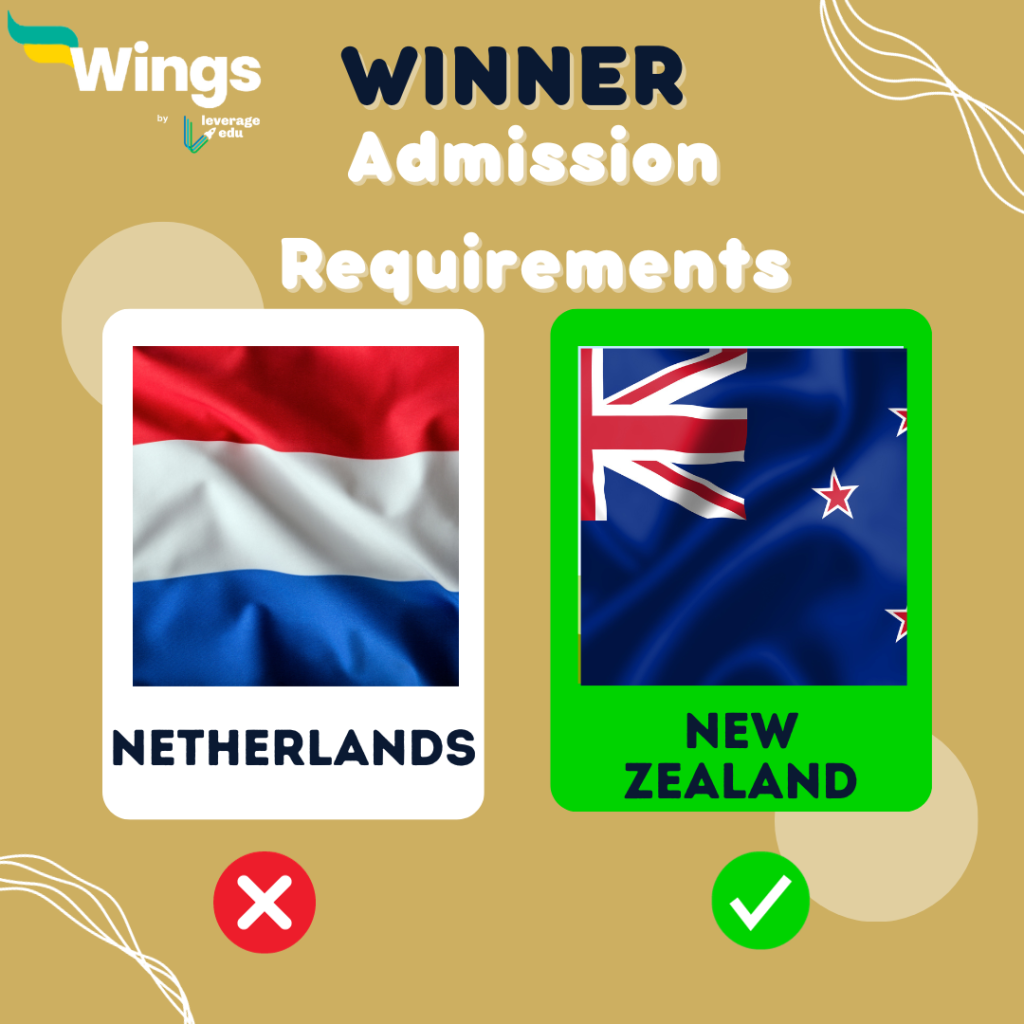
Also Read: PhD in the Netherlands
Tuition Fees
In this section, we will compare the Netherlands and New Zealand, and find out which country has the lowest cost of education. The country with the lowest tuition expense will be granted +2 points.
Tuition Fees in the Netherlands
The average annual tuition fees in the Netherlands according to the website of the universities in the country are listed in the table given below:
| Study Program | Average Annual Tuition Fee |
| Undergraduate | €6,000 – €15,000 |
| Postgraduate | €8,000 – €20,000 |
| Doctoral | €6,000 – €20,000 |
Tuition Fees in New Zealand
The average annual tuition fees in New Zealand according to the website of the universities in the nation are listed in the table given below:
| Study Program | Average Annual Tuition Fee |
| Undergraduate | NZ$20,500 – NZ$25,000 |
| Postgraduate | NZ$19,000 – NZ$50, 000 |
| Doctoral | NZ$6,500 – NZ$9,000 |
Which Country is Better?
The tables above show that the overall tuition fees in New Zealand are lower than in the Netherlands. Hence, New Zealand will be awarded a +2 score in this round of our Netherlands vs. New Zealand contest.
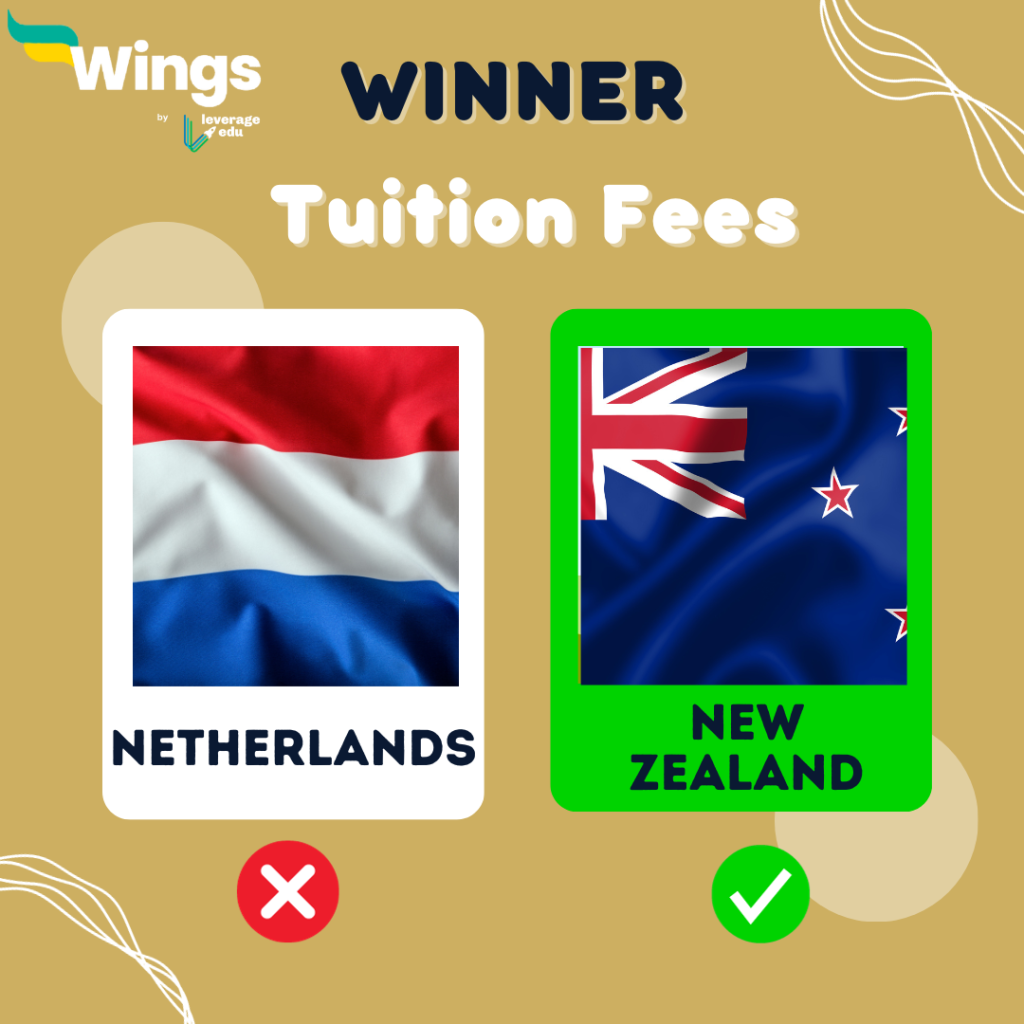
Also Read: List of MBA Scholarships in the Netherlands
Living Expenses
Before you plan to move to your desired country, you need to be aware of its living expenses. In this segment, we will compare the Netherlands and New Zealand in terms of cost of living. Let’s find out which country has a lower cost of living.
Cost of Living in the Netherlands
As per Numbeo’s website, the cost of living in the Netherlands is as follows:
| Monthly Rent | €967.26 – €1,817.26 |
| Average Apartment Price (Price per Square Metre) | €3,669.49 – €5,044.22 |
| Average Cost of an Inexpensive Restaurant Meal | €15 |
| Average Transportation Cost (Monthly) | €80.95 |
| Average Cost of Utility (Monthly) | €277.51 |
Cost of Living in New Zealand
The cost of living in New Zealand as per Numbeo is given in the table below:
| Monthly Rent | NZ$1,538.83 – NZ$3,061.61 |
| Average Apartment Price (Price per Square Metre) | NZ$8,995.46 – NZ$10,827.41 |
| Average Cost of an Inexpensive Restaurant Meal | NZ$25 |
| Average Transportation Cost (Monthly) | NZ$176.01 |
| Average Cost of Utility (Monthly) | NZ$376.17 |
Which Country is Better?
The tables above show that the overall cost of living in New Zealand is lower than in the Netherlands. Hence, New Zealand will receive +2 points in this section of our Netherlands vs. New Zealand contest.
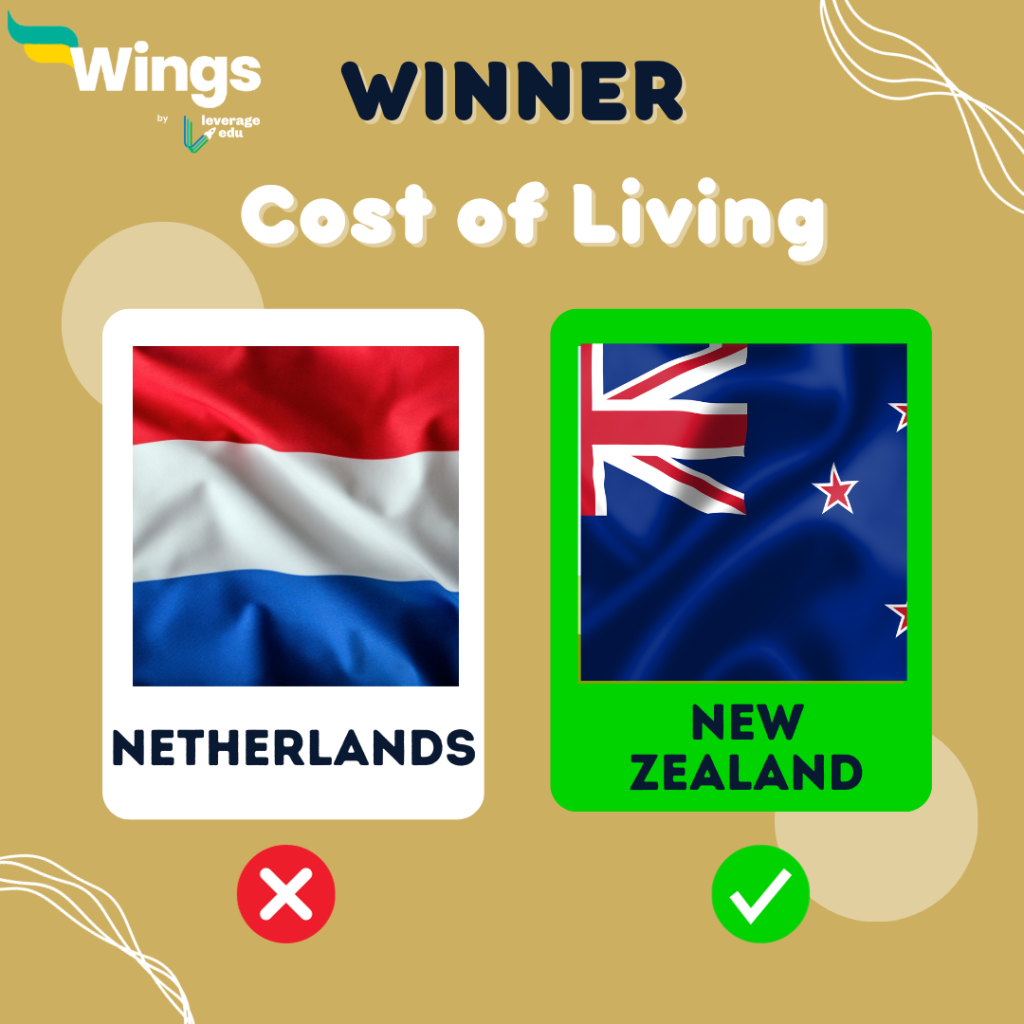
Also Read: Study in New Zealand for Indian Students
Work Permit and PR
Students often go abroad to pursue their higher education with the goal of finding a job and eventually obtaining permanent residency. Let’s understand the easiness of obtaining a work permit and permanent residency in the Netherlands and New Zealand.
Work Permit in the Netherlands
A work permit is granted in the Netherlands as shown below:
Eligibility Criteria for a Work Permit in the Netherlands:
- The applicants are required to have a valid employment contract with a Dutch employer.
- The employer of an applicant has to demonstrate that the job vacancy could not be filled by a Dutch or other EU/EEA national.
- If you are an employee who is above the age of 23, then you need to earn at least the minimum wage.
Apply for a Work Permit in the Netherlands:
The applicants are required to apply for a visa in person at the Dutch mission, embassy, or consulate in their nation of residence. One can reach out to a Dutch mission in another country if it is not possible. The processing time for the work permit in the Netherlands typically ranges between 2 weeks to 90 days.
PR in the Netherlands
Non-EEA residents who have lived in the Netherlands for over 5 years are eligible to apply for permanent residency.
Work Permit in New Zealand
The work permit is granted in New Zealand in the following ways:
Eligibility Criteria for a Work Permit in New Zealand
You need to fulfil the following criteria in order to become eligible for a temporary work visa in New Zealand:
- You need to have a job offer from an employer based in New Zealand,
- You are also eligible if you have a spouse in New Zealand and you want to join them and work,
- You are deemed eligible if you are from a country with a special work programme,
- You can also get a work permit if you are coming for a specified work-related purpose to the country, or
- You can apply for a work permit if you have been studying in New Zealand and now want to work here.
Apply for a Work Permit in New Zealand
After fulfilling the criteria and gathering your documents, you are ready to apply for the Zealand Work Visa. The steps for the application process are given below:
1st Step: Find employment in New Zealand,
2nd Step: Collect all of your documents,
3rd Step: Now, submit your application for a work visa, and
4th Step: Relax while your visa is getting processed.
The processing of a New Zealand work permit can take anything from 3 to 7 months.
PR in New Zealand
You need to have spent at least 184 days in New Zealand on a resident visa in each of the two years preceding your application for permanent residence. This two-year period starts when you apply for permanent residence and does not incorporate the two years since you received your resident visa.
Which Country is Better?
As we can see from the above comparison, the process of receiving a work permit and permanent residency is easier in New Zealand than in the Netherlands. Hence, New Zealand will obtain +2 points in this round of the New Zealand vs. Netherlands.
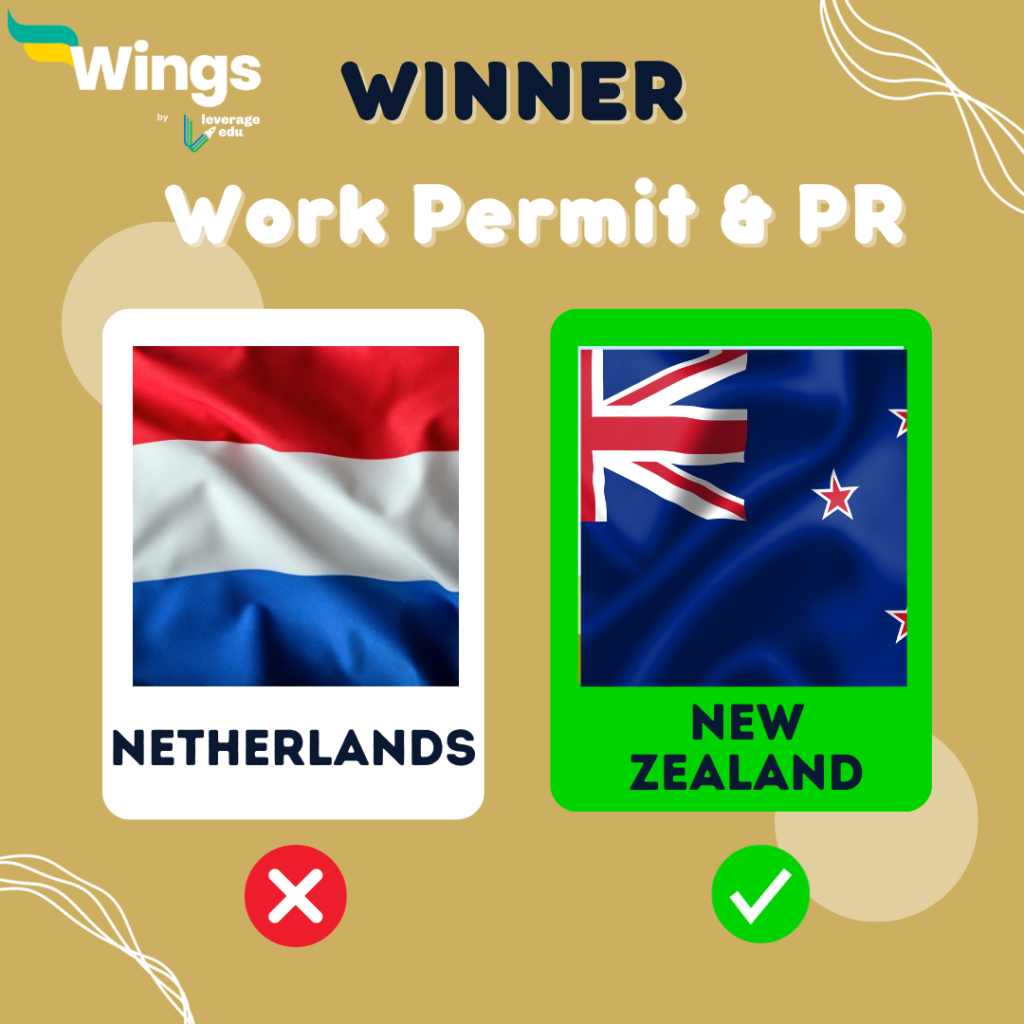
Also Read: Medical Colleges in New Zealand
Average Salaries: Netherlands vs. New Zealand
The average salary for a graduate is €46,665 per year in the Netherlands, according to WeAreDevelopers. On the other hand, it is roughly €56,870 per year after postgraduation, as per Glassdoor. The average annual pay after graduation in New Zealand is NZ$43,103, according to Indeed. On the other hand, it is NZ$73,953 after finishing postgraduation.
Which Country is Better?
As we can see from the above comparison, the Netherlands offer a higher salary when compared to New Zealand. Hence, the Netherlands will receive a score of +2 in this round of our Netherlands vs. New Zealand contest.
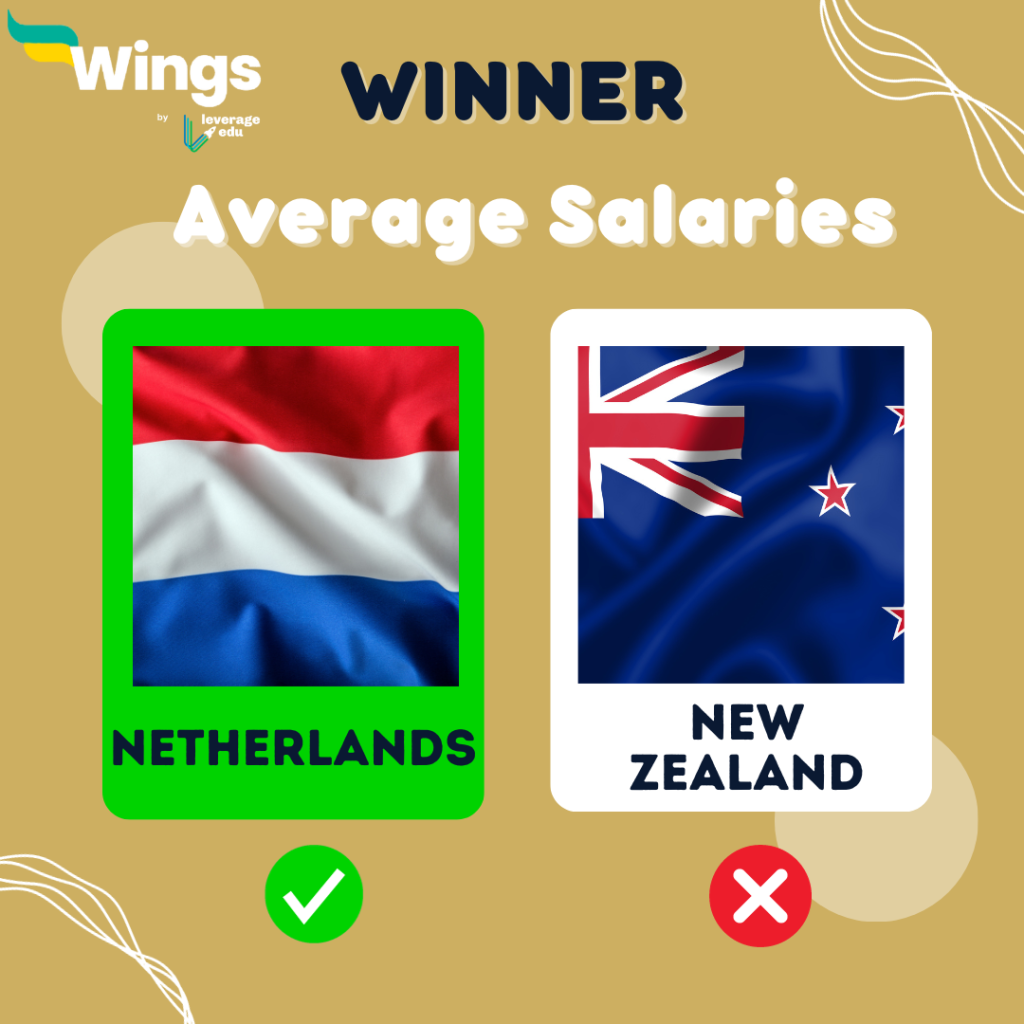
Also Read: 100 Interesting Facts About New Zealand
Other Major Elements
Let’s have a look at some of the other main considerations to keep in mind when deciding where to pursue education. These crucial considerations are as follows:
Climate
The Netherlands has a mild maritime climate, and it is famous for having chilly summers and warm winters. The country doesn’t experience any dry seasons, and precipitation is seen throughout the year. Coming to New Zealand, its climate differs, ranging from warm subtropical in the far north to cool temperate in the extreme south, with harsh alpine conditions in the mountainous parts.
Safety
The Netherlands is known for being a very safe nation. Serious crimes, including murder, narcotics, and other forms of human hostility are very rare to occur in the country. On the other hand, New Zealand has been ranked the second safest country on the Global Peace Index. Both the Netherlands and New Zealand have low crime rates, so you should have no problems while studying in any of these countries.
Culture for International Students
The Netherlands is renowned for its openness to overseas students. The culture of this country is very diverse, and the Dutch people are known for being very kind. Talking about New Zealand, the country warmly welcomes and supports international students.
Also Read: Universities Accepting Backlogs in New Zealand
Conclusion
When the total scores of the Netherlands and New Zealand are calculated, we find that the Netherlands has received 4 points, while New Zealand has received 8 points. Hence, New Zealand has won this contest against the Netherlands.
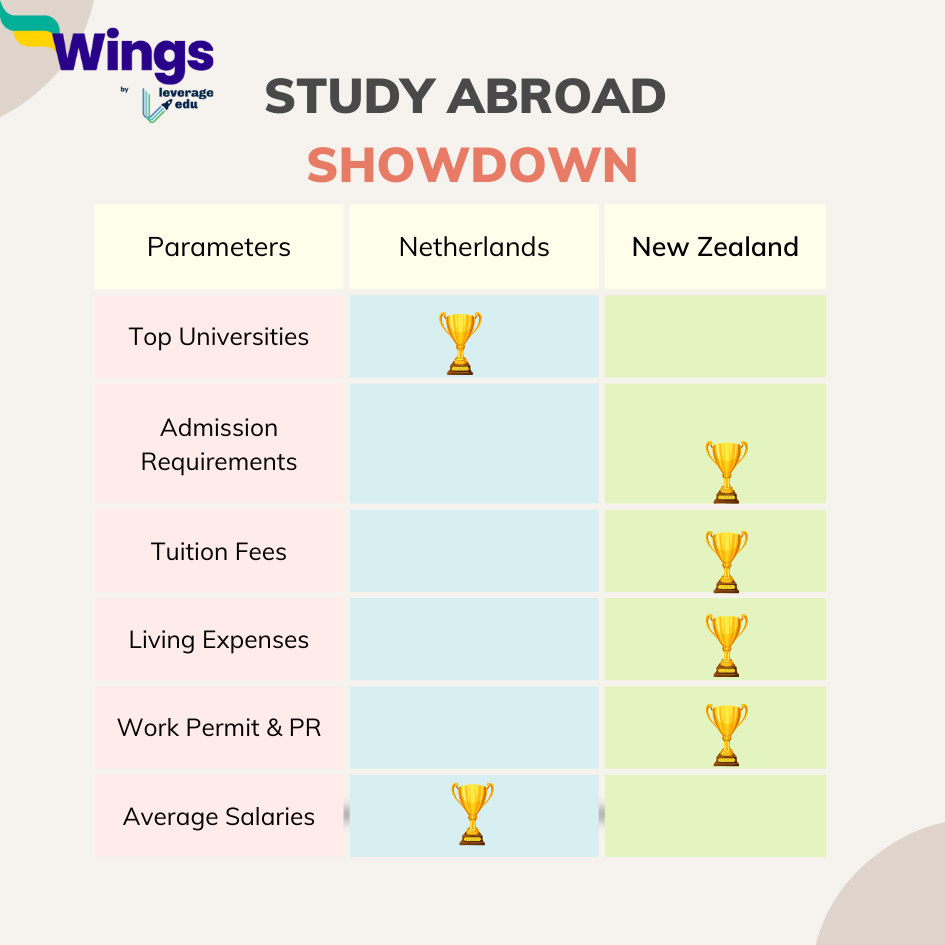
But you should not forget that both the Netherlands and New Zealand have their own advantages and disadvantages. It is ideal to choose a degree before you apply for admission to any country’s universities.
You need to consider the education facilities and financial aid available for the program of your choice so that you can make a better-informed decision. With that being said, both the Netherlands and New Zealand are excellent destinations for pursuing higher education.
Also Read: Study in New Zealand without IELTS
FAQs
Ans. The Netherlands has the second largest population of Indian origin in Europe, next only to the United Kingdom. The Netherlands has strong cultural ties with India and has a thriving Indian community.
Ans. New Zealand provides a welcoming and multicultural environment to Indian students, along with a world-class education.
Ans. Yes, the Netherlands is home to numerous prominent universities offering a world-class education and a plethora of opportunities in terms of employment to international students.
So, this was all about the Netherlands vs. New Zealand. Many Indian students dream of pursuing education in foreign nations due to the exposure and career growth they offer. Consider joining a free counselling session with Leverage Edu if you plan to study abroad.


 One app for all your study abroad needs
One app for all your study abroad needs











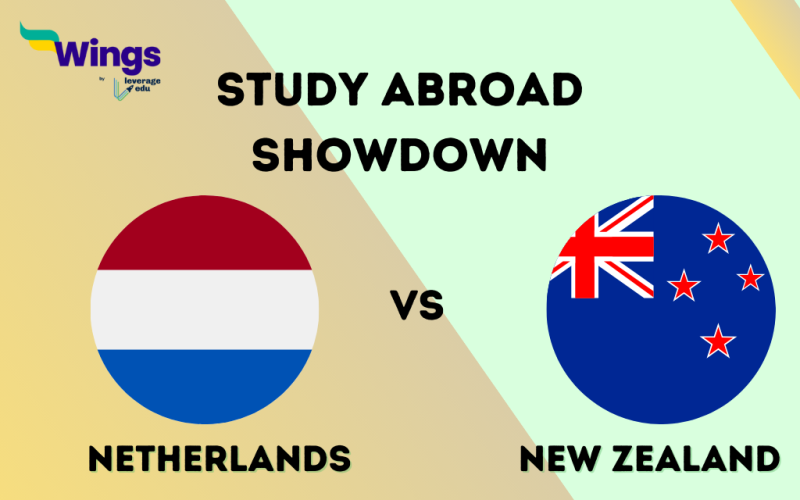
 60,000+ students trusted us with their dreams. Take the first step today!
60,000+ students trusted us with their dreams. Take the first step today!